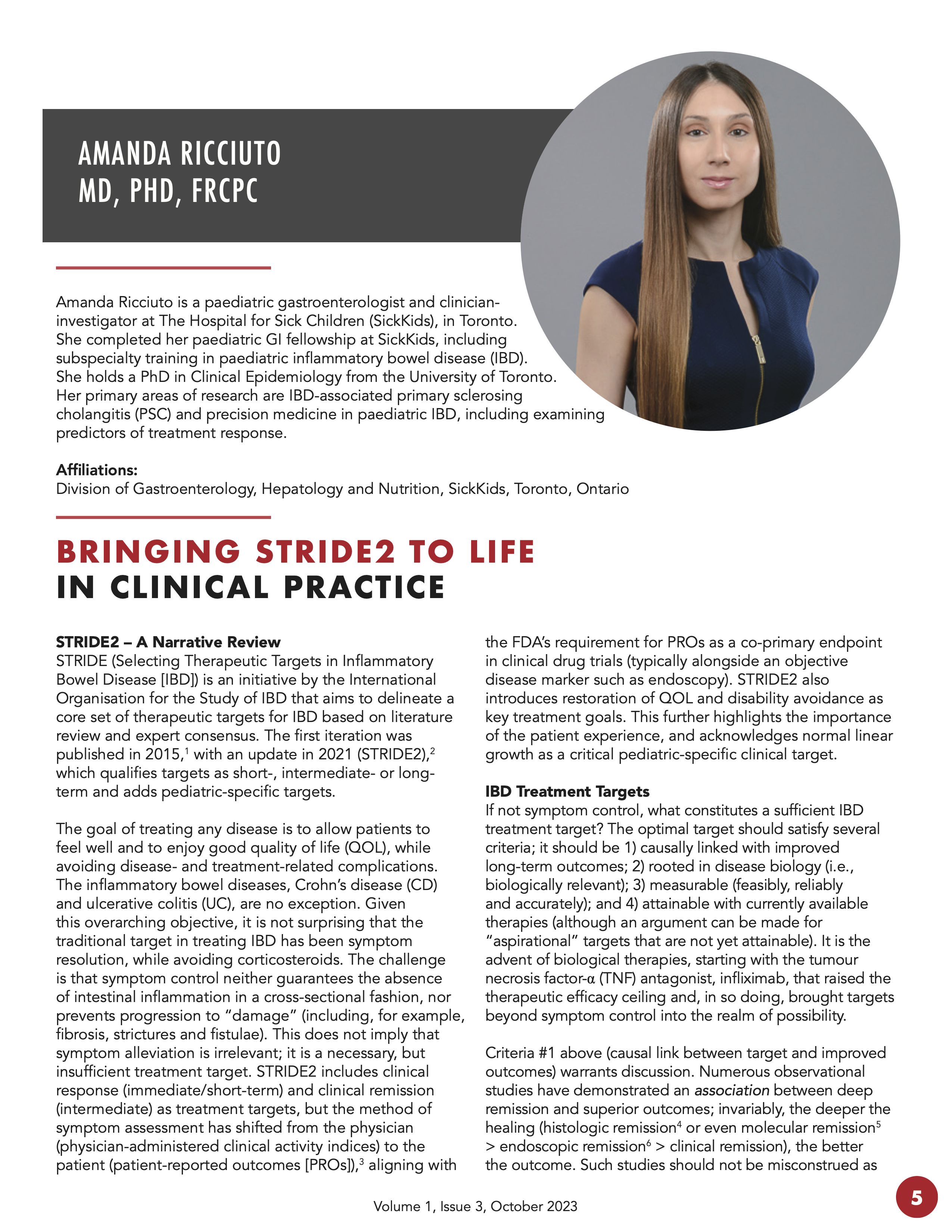Bringing STRIDE2 to Life in Clinical Practice
DOI:
https://doi.org/10.58931/cibdt.2023.1316Abstract
STRIDE (Selecting Therapeutic Targets in Inflammatory Bowel Disease [IBD]) is an initiative by the International Organisation for the Study of IBD that aims to delineate a core set of therapeutic targets for IBD based on literature review and expert consensus. The first iteration was published in 2015, with an update in 2021 (STRIDE2), which qualifies targets as short-, intermediate- or long-term and adds pediatric-specific targets.
The goal of treating any disease is to allow patients to feel well and to enjoy good quality of life (QOL), while avoiding disease- and treatment-related complications. The inflammatory bowel diseases, Crohn’s disease (CD) and ulcerative colitis (UC), are no exception. Given this overarching objective, it is not surprising that the traditional target in treating IBD has been symptom resolution, while avoiding corticosteroids. The challenge is that symptom control neither guarantees the absence of intestinal inflammation in a cross-sectional fashion, nor prevents progression to “damage” (including, for example, fibrosis, strictures and fistulae). This does not imply that symptom alleviation is irrelevant; it is a necessary, but insufficient treatment target. STRIDE2 includes clinical response (immediate/short-term) and clinical remission (intermediate) as treatment targets, but the method of symptom assessment has shifted from the physician (physician-administered clinical activity indices) to the patient (patient-reported outcomes [PROs]), aligning with the FDA’s requirement for PROs as a co-primary endpoint in clinical drug trials (typically alongside an objective disease marker such as endoscopy). STRIDE2 also introduces restoration of QOL and disability avoidance as key treatment goals. This further highlights the importance of the patient experience, and acknowledges normal linear growth as a critical pediatric-specific clinical target.
References
Peyrin-Biroulet L, Sandborn W, Sands BE, et al. Selecting therapeutic targets in inflammatory bowel disease: (STRIDE): determining therapeutic goals for treat-to-target. Am J Gastroenterol. 2015;110:1324-1338. DOI: https://doi.org/10.1038/ajg.2015.233
Turner D, Ricciuto A, Lewis A, et al. STRIDE-II: An update on the selecting therapeutics targets in inflammatory bowel disease (STRIDE) initiative of the International Organization for the Study of IBD (IOIBD): determining therapeutic goals for treat-to-target strategies in IBD. Gastroenterology. 2021;160:1570-1583. DOI: https://doi.org/10.1053/j.gastro.2020.12.031
Marcovitch L, Focht G, Carmon N, et al. Development and validation of the TUMMY-UC: a patient-reported outcome for pediatric ulcerative colitis. Gastroenterology. 2023;164:610-618.e4. DOI: https://doi.org/10.1053/j.gastro.2022.12.006
Yoon H, Jangi S, Dulai PS, et al. Incremental benefit of achieving endoscopic and histologic remission in patients with ulcerative colitis: a systematic review and meta-analysis. Gastroenterology. 2020;159:1262-1275.e7. DOI: https://doi.org/10.1053/j.gastro.2020.06.043
Argmann C, Hou R, Ungaro RC, et al. Biopsy and blood-based molecular biomarker of inflammation in IBD. Gut. 2023;72:1271-1287. DOI: https://doi.org/10.1136/gutjnl-2021-326451
Arai M, Naganuma M, Sugimoto S, et al. The ulcerative colitis endoscopic index of severity is useful to predict medium-to-long-term prognosis in ulcerative colitis patients with clinical remission. J Crohns Colitis 2016;10:1303-1309. DOI: https://doi.org/10.1093/ecco-jcc/jjw104
Colombel JF, Panaccione R, Bossuyt P, et al. Effect of tight control management on Crohn's disease (CALM): a multicentre, randomised, controlled phase 3 trial. Lancet. 2017;390:2779-2789. DOI: https://doi.org/10.1016/S0140-6736(17)32641-7
Mosli MH, Zou G, Garg SK, et al. C-reactive protein, fecal calprotectin, and stool lactoferrin for detection of endoscopic activity in symptomatic inflammatory bowel disease patients: a systematic review and meta-analysis. Am J Gastroenterol. 2015;110:802-19; quiz 820. DOI: https://doi.org/10.1038/ajg.2015.120
Danese S, Vermeire S, D'Haens G, et al. Treat to target versus standard of care for patients with Crohn's disease treated with ustekinumab (STARDUST): an open-label, multicentre, randomised phase 3b trial. Lancet Gastroenterol Hepatol. 2022;7:294-306. DOI: https://doi.org/10.1016/S2468-1253(21)00474-X
Daperno M, D'Haens G, Van Assche G, et al. Development and validation of a new, simplified endoscopic activity score for Crohn's disease: the SES-CD. Gastrointest Endosc. 2004;60:505-512. DOI: https://doi.org/10.1016/S0016-5107(04)01878-4
Travis SP, Schnell D, Krzeski P, et al. Reliability and initial validation of the ulcerative colitis endoscopic index of severity. Gastroenterology. 2013;145:987-995. DOI: https://doi.org/10.1053/j.gastro.2013.07.024

Published
How to Cite
Issue
Section
License
Copyright (c) 2023 Canadian IBD Today

This work is licensed under a Creative Commons Attribution-NonCommercial-NoDerivatives 4.0 International License.
